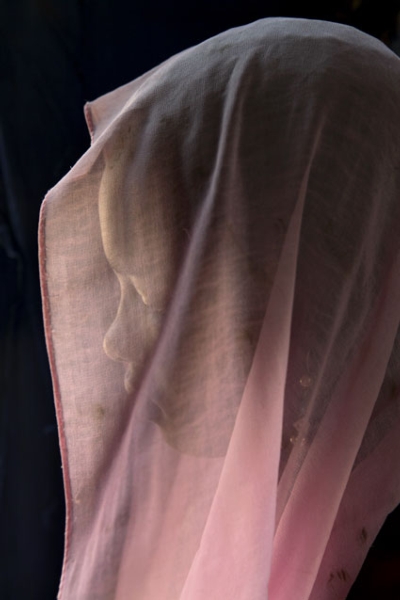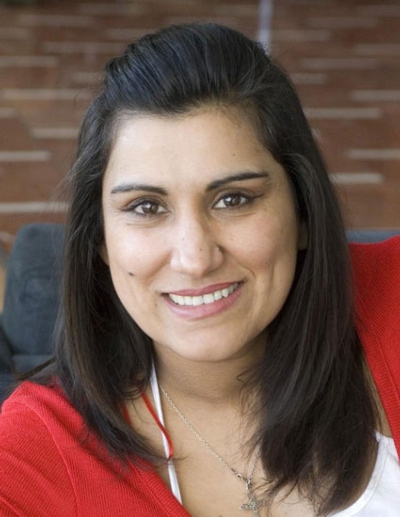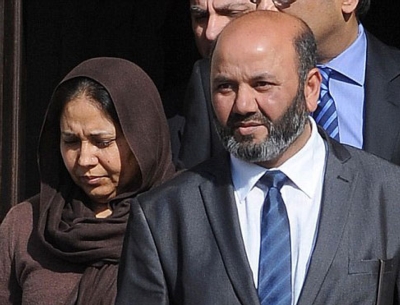
Jasvinder Sanghera, founder and chief executive of the charity Karma Nirvana, is telling me about a hairbreadth escape one of the organisation’s counsellors helped to secure. A young girl had called the helpline because she was suspicious that her family was planning to take her to Pakistan and force her into marriage. The counsellor gave her several pieces of advice, but the critical one turned out to be this: if you get to the airport and you think you’re going to be forced into marriage, go to the bathroom and put a spoon in your knickers.
Sanghera continues the story: “So she gets to Heathrow and through customs, and her family say, ‘How dare you dishonour this family by behaving the way you do. Well, you’re going to be married when we get you to Pakistan.’ So she went in the toilet, put the spoon in her knickers. She walked through security, set off the alarm bells, the airport staff took her to one side and she told them what had happened, and we rescued her that way. She never left the country.”
That moment of rescue can be the difference between a life of choice and opportunity and a life entirely controlled by others. But such moments are routinely and tragically missed – something made painfully clear during the trial and conviction of Iftikhar and Farzana Ahmed in August for the 2003 murder of their daughter Shafilea after she resisted a forced marriage in Pakistan.
The idea of being compelled into partnership with a person you haven’t chosen and may not even know is distressing enough in itself, but it’s only one aspect of a brutal practice that also involves kidnap, violence, coercion, financial exploitation, rape (because forced marriage implies forcible consummation) and compulsory childbearing. The assault on an individual’s autonomy doesn’t end with the wedding, and it doesn’t begin there either. As one teacher in a Sheffield secondary school explained to me, “It’s really hard to motivate someone to do their GCSEs when they know they’re getting married off.”

The victims are mostly women, but men are affected too – according to the Home Office’s Forced Marriage Unit, 22 per cent of those given advice or support relating to forced marriage in 2011 were male. They’re young and dependent on the families that are abusing them: 47 per cent of the victims who contact Karma Nirvana’s helpline are under 21, though one case identified by the Home Office involved an 87-year-old. The vast majority are British Asian, but not exclusively: experts I spoke to for this piece mentioned examples from Chinese, Jewish and white British communities, and it’s possible that the emphasis on this as a specifically Muslim problem means it remains under-reported in other demographics.
But regardless of background, forced marriage is a form of domestic abuse. And as with all domestic violence, any perceived abnormality can be a trigger – meaning the most vulnerable are particularly at risk. Those like the girl with the teaspoon in her knickers who are considered too “westernised” and rebellious, LGBT individuals and people with physical or learning disabilities have all been pressed into marriage by parents who may confusedly believe that they are doing the right thing for their child and helping them to become “normal”.
Nonetheless, it is an issue that has strong associations with ethnicity and culture, and that gives rise to particular responsibilities for religious and community leaders – as well as particular sensitivities. “We believe forced marriages are wrong,” says Shaykh Ibrahim Mogra of the Muslim Council of Britain. “They have no basis, not in Islam and not in any civilised culture. They should be opposed and they should be condemned.” There’s anecdotal evidence, though, that not everyone feels comfortable taking a strong stance against it, and some outreach efforts have been sabotaged by misplaced delicacy. “Schools are a huge challenge,” says Sanghera. “We cannot get the schools to engage.”
This year, she ran a stall at the National Union of Teachers conference, offering Karma Nirvana posters to teachers and challenging them to put them on display in their schools. “Many teachers came to my stall and many said, ‘Well, we couldn’t put them up. It’s cultural, we wouldn’t want to offend communities and we wouldn’t get support from the headteacher.’ And that was the majority view of over a hundred teachers who came to speak to me.”
One teacher who did take a poster subsequently sent Sanghera pictures of it on a notice board in his school. That, however, wasn’t the end, as Sanghera explains: “And then within 24 hours of him putting up the posters, the headteacher tore them all down. Not only did she tear them down, she took him into her office and she said to him, ‘Under no circumstances must you ever display those posters again because we don’t want to upset our Muslim parents.’” For his part, Ibrahim Mogra stresses that such posters are routinely and prominently on show in both schools and community centres, and that he and other imams have preached against forced marriage.
There is also multi-agency statutory guidance from the government on preventing forced marriage, and the 2007 Forced Marriage Act allows victims (or a third party acting for a victim, such as the police, a voluntary sector worker, a family member or a friend) to apply for a Forced Marriage Protection Order that may prevent a potential victim from being taken abroad. Yet the fact that the Home Office’s Forced Marriage Unit is still dealing with over 100 cases a month suggests that the preventative measures available are either insufficient or poorly enacted.
“If they were being implemented, then we would have a whole series of awareness among the [statutory] organisations,” says Sanghera. Instead, it is frighteningly easy for all the danger signs to be spotted by different agencies, and yet for nothing to be done. Shafilea Ahmed was murdered in 2003, seven years before the statutory guidance was introduced, but her case illustrates the deadly consequences of a failure to act. Her teachers were aware that she was a victim of domestic violence, and she confided in a homelessness officer that she was being forced to marry a cousin in Pakistan, but she refused intervention from a social worker and no further action was taken in her case. Less than a year later, she was suffocated with a plastic bag on the family sofa by her own parents.

This June, the prime minister and home secretary announced that forced marriage would be criminalised in the 2013-14 parliamentary session. Everyone interviewed in this feature emphasises the importance of the new legislation leaving victims the discretion to pursue civil or criminal proceedings as they feel appropriate, but there is substantial disagreement about how desirable criminalisation is.
It’s a move that Sanghera supports: “We have laws [against violence and abduction], but what we don’t have is prosecutions. The number of prosecutions is woefully low in comparison to the thousands of reports that we’re seeing. What exists is not being used.” Criminalisation would, she says, “give voice to the experiences of the victims and enable organisations like the police to say, ‘This is against the law, this isn’t cultural, this is a criminal offence.’ This sends a very clear message, and I do believe one should legislate to change hearts and minds.”
But there’s also a hearts-and-minds argument against criminalisation, and again this can be illustrated through the Ahmed case. Even without forced marriage being criminalised, Shafilea was unwilling to cooperate with social services against her own parents. Shaykh Ibrahim Mogra thinks that reluctance will only be heightened by the proposed legislation: “The Muslim Council of Britain’s position is that we do not believe that this would be a wise and useful way forward. We believe that no young woman would report her father knowing that her father would be imprisoned.”
And the more vulnerable an individual is, the more dependent they are on their parents, and the more difficult it becomes to take action. That’s why those working with learning-disabled people are particularly cautious about the new legislation. The Forced Marriage Unit reports that it dealt with 58 cases involving learning-disabled people in 2011 – that’s about 4 per cent of the total but, as Mencap’s campaigns officer Jo Davies explains, the link between learning disability and forced marriage has only recently started to be appreciated, and it’s almost certainly under-reported.
There’s a greater than average incidence of learning disability in South Asian families, as well as a higher prevalence of forced marriage. Stigma against disability tends to be higher, while black and ethnic minority families are less likely to be engaged with social or medical support services, and people with learning disabilities face troubling barriers to accessing help. With all that taken into account, the number of cases of forced marriage imposed on people with learning disabilities is likely to be substantially higher than we know so far. (An infant teacher from inner-city Leicester underlines this. When informing South Asian parents that their child may have a learning disability, she says, it’s not uncommon for these concerns to be brushed away with an assertion of the child’s marriage prospects: “They say, ‘She’ll make a lovely little mum,’ or, ‘Someone will pay a lot because he’ll get them into the country.’”)
When it comes to criminalisation, though, Davies is ambivalent. “It’s a very difficult one,” she says. “On the one hand, any step that deters people from forcing their children or family members into marriage is a good one, but criminalising it does have its dangers. It means that people will be less likely to come forward.” But the main problem, she says, is that the authorities are currently wedded to a “reactive” approach and can only move to protect people when they’re already in danger – a danger that learning-disabled people may find difficult to identify and articulate. Instead, she wants the risk of forced marriage to be assessed as a matter of course when agencies come into contact with learning-disabled people, and for families to be assured that a learning-disabled dependent will receive ongoing care.
That last part is particularly important, because Davies is alone among my interviewees in offering a sympathetic explanation for forced marriage: “It can be a way that parents think they’re doing the right thing, of making sure that their child will be cared for. It’s often a case of parents not getting the support that they need.” But even if the intentions are well-meaning, the ultimate effect on the victim is still catastrophic. Mandy Sanghara has been campaigning on this issue for 20 years, and has helped in some exceptionally distressing cases where learning-disabled individuals have been exploited for immigration status, beaten and had their benefits stolen by spouses they have been forced to marry. “Asian parents don’t know the difference between a forced marriage and an arranged marriage,” says Sanghara.
Clearly that’s not universally true but, as the stories of Jasvinder Sanghera, Shafilea Ahmed and countless others testify, there is a huge job to be done, both in terms of educating parents about respecting their children’s choices and in teaching children about the rights they have to a self-determined private life. The imams have a role in that, and the Muslim Council of Britain has stated its intention to provide leadership. But that alone is not enough.
This is a job for the entire community – not community as in one specific ethnic group, but everyone who comes into contact with at-risk children and vulnerable adults and has an opportunity to identify and prevent abuse, including forced marriage. The effects of criminalisation are impossible to judge until the law is implemented, but that can only be a small part of the vast attitudinal change required. Above all, forced marriage needs to be seen unambiguously as a form of abuse and not excused or sanctioned by labelling it a cultural issue. “I always say, forced marriage is for life,” says Jasvinder Sanghera. The lives of hundreds of people every year can be saved from cruelty and despair if forced marriage is no longer tolerated.
For more information on combating forced marriage and helping those affected, visit the Karma Nirvana website or contact the Forced Marriage Unit of the Home Office.

